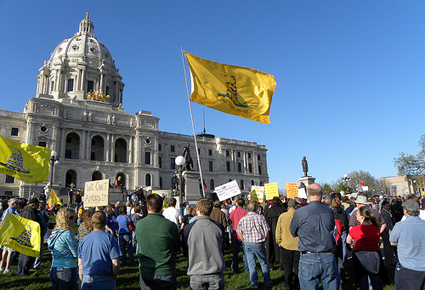Left-leaning media debate potential political impact of the Tea Party

While some pundits and politicians on the left have tried minimizing the Tea Party as an irrelevant sect in American politics, others on the left are saying otherwise. Media Matters, Daily Kos, and MSNBC have attacked the Tea Party as an unintelligent fringe group.
However, as those attacks continue, it’s definitely a surprise to see liberal publications like The New York Times acknowledge that the Tea Party could be the death knell of the current Washington establishment. The Times reports that Tea Party candidates are running strong in Republican-leaning Congressional districts, as well as in other non-Republican districts. Their impact might be so strong that they’ll be enough of a force to push forward an agenda in both the House and the Senate in the new term.
What's even more of a surprise is that the acknowledgement comes from Times reporter Kate Zernicke. Zernicke came under fire earlier this year for her coverage of a speech by a former conservative activist at the annual Conservative Political Action Conference. So, while the Times gets pounded by conservatives for biased coverage, it doesn’t completely take away their credibility in reporting the facts in certain cases.
The Washington Post, another left-leaning publication, recently published a piece discussing a fresh analysis of Tea Party signs at rallies. The analysis, conducted by UCLA student Emily Ekins, found that approximately a quarter of rally signs directed anger at the President and that racial content was not as widespread as depicted by other media outlets. Miss Ekins’s research found that the Tea Party’s message centered on limited government, liberty, lower taxes, fiscal responsibility, and free market capitalism.
The more accurate message of the movement itself is still getting out to voters, thanks to news outlets who adhere to the grand tradition of journalism. Negative Tea Party coverage, as exemplified by CNN in the beginning of the movement, doesn’t seem to have distanced voters from embracing it as a genuine grassroots effort. In fact, the Tea Party has polled relatively well with mainstream voters.
While certain candidates within the Tea Party movement have been prone to gaffes, the Tea Party itself hasn’t really suffered any measurable damage from these setbacks. Perhaps the reason lies in the fact that voters are tired of politicians who think they’re entitled to political power. The true test comes in 18 days, when we find out whether a true people-driven revolution has arrived.



